With the Atlanta Thrashers moving from the southeastern United States to central Canada, the talk of NHL realignment has been a popular one as of late. It's a subject we have our own opinions and convictions about.
As a starting point, here is a map of the location of all the NHL teams for the just completed 2010-11 season.
2010-11 NHL Divisional Alignment
The things to note are the compactness of the Northeast and Atlantic Divisions, especially compared with the Northwest and Pacific Divisions in the Western Conference. Also of note are the distances from both Minnesota and Dallas, both located in the Central Time Zone, from all the other teams in their divisions, none of which are even located in the same time zone.
Now let's take a look at the 2011-12 NHL team locations, swapping Atlanta for Winnipeg, using a Jets icon for the time being.
NHL 2011-12 Team Locations
Keeping the current divisional alignment relatively intact, we propose adding Winnipeg to the Northwest Division, moving Minnesota to the Central and shifting Nashville to the Southeast.
This would reunite Minnesota with St. Louis, Chicago and Detroit from the days of the old Norris Division of the 1980's and place them in a division with teams from the same Central Time Zone. It would also reunite Winnipeg with Edmonton, Calgary and Vancouver of the Smythe Division of the same era. While Winnipeg would now find themselves in a somewhat similar position as Minnesota, being isolated in the Central Time Zone, it would be a better situation, as they would be in a division with three other Canadian teams, reducing the number of border crossings Minnesota had to endure.
While Nashville would be located farther from their closest rivals than they are now, someone needs to move east, and separating Detroit from Chicago and St. Louis is something we would never want to do. Moving Columbus into the Southeast instead of Nashville is a possibility, but looking at the map, the proximity of Columbus to Detroit, combined with the southern location of Nashville, makes this the preferred option in our minds.
2011-12 NHL 6 Division Proposal
We considered another possibility, moving two teams to the Southwest, both Nashville and Columbus, hoping to move Washington into the Atlantic division along with nearby Philadelphia and the three New York/New Jersey clubs. The fly in the ointment would be requiring one eastern team to move west, with Pittsburgh being the candidate to join Detroit, Chicago, St. Louis and Minnesota. Pittsburgh would never agree to being moved west to play the likes of San Jose, Vancouver and Los Angeles, and Toronto would not want to leave Ottawa and Montreal, so we see no hope for this plan. Washington seems permanently stuck in the Southeast due to the high concentration and high volume of teams in the Northeast.
Still, with our 6 Division proposal all sorted out, we still have one major flaw we just cannot tolerate, the Dallas Stars being isolated in the Pacific Division, 866 miles from their nearest neighbors in Phoenix. This is due to the poor idea of dividing the western half of the continent into north and south, placing Colorado with the four teams north of them and the three California teams with the two clubs, Phoenix and Dallas, which were located equally as far south, despite how far east Dallas and Minnesota were.
What we propose is to make the divisional alignments based on vertical divisions, rather than the current horizontal alignments. Additionally, we also would embrace the American Hockey League model, reducing the number of divisions to just four. Each conference would be made of one seven and one eight team division.
The method we would use to place the teams in each of the four divisions begins in the northeast and places Montreal, Ottawa and Toronto together, adding in Buffalo. The Division is then completed with the three New York/New Jersey teams and traditional New York rival Boston, who stay in the same division with their rivals Montreal.
The remaining seven teams in the east are the two Pennsylvania clubs Philadelphia and Pittsburgh, as well as Washington, who belong in a division with nearby Philadelphia. The four remaining southern teams, Carolina, Nashville, Tampa Bay and Florida round out the group.
In the west, we simply group the seven teams which are the furthest west, San Jose, Los Angeles and Anaheim are grouped with nearby Phoenix and the three western-most Canadian teams, Vancouver, Edmonton and Calgary.
The Central Division is based on grouping Winnipeg, Minnesota and Dallas together since they are located in a relative vertical line. Traditional rivals St. Louis, Chicago and Detroit are then added. Columbus is included due to its proximity to Detroit and the Division is rounded out with Colorado in order to lessen the isolation of Dallas.
2011-12 NHL 4 Division Proposal
Colorado could just as easily be shifted to the Western Division based on their preference, as placing them in the West Division would avoid a repeat of a club being in a division with no other members located in it's time zone.
2011-12 NHL 4 Division Proposal #2 with Colorado in the Western Division
In addition to grouping the teams in a more fair and logical way, even more importantly, the playoffs would return to the system once used by the NHL, where the first two rounds of the playoffs would be played exclusively within your own division among the top four in each division. The benefit of this development would be the increased number of times clubs would face the same teams during the playoffs as the years would go by, and if there's one thing we will scream from the top of our lungs until Gary Bettman believes it, is that rivalries are created during the playoffs. Playing the same teams over and over during the regular season makes for repetitious boredom, while playing to end your opponent's season creates intensity and drama.
Two rounds of playoffs among the same seven teams gives you a 1-in-3 chance of facing the same team as the previous season, when compared to a 1-in-7 chance of repeating an opponent from the previous season as it stands now. In reality, the odds of facing the same team improves in the short term when you factor in successful teams making the playoffs more often while they are in periods of greater success.
The NHL would likely then have the division winners in each conference face each other to determine a conference champion, but we'd like to see the final four teams seeded by points. This would have several benefits, the first being that if two strong teams advanced from one conference and the lowest two from the other,
as happened in 2002-03., this system would increase the chances of the most competitive Stanley Cup Finals possible as well as allowing for the possibility of an occasional Philadelphia vs. New York or Boston vs. Washington final.
After implementing this alignment, we'd also adjust the schedule to include playing every team in the league at home every year in the manner of the NBA schedule.
The breakdown would be;
If you are in the seven team division;
- You play the 15 teams in the other conference twice a year = 30 games
- You play the 8 teams in the other division of your conference twice a year = 16 games
- You play the other 6 teams in your division 6 times a year = 36 games
If you play in the eight team division;
- You play the 15 teams in the other conference twice a year = 30 games
- You play the 7 teams in the other division of your conference twice a year = 14 games
- You play the other 7 teams in your division 5 times a year = 35 games
- You play the remaining 3 games in your division among the 7 teams on a rotating annual basis = 3 games
It's a topic there are naturally many, many solutions to and opinions on, so feel free to add yours in the comments below.

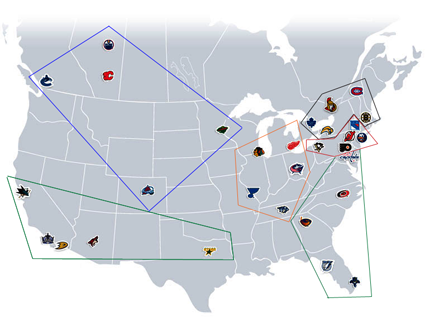
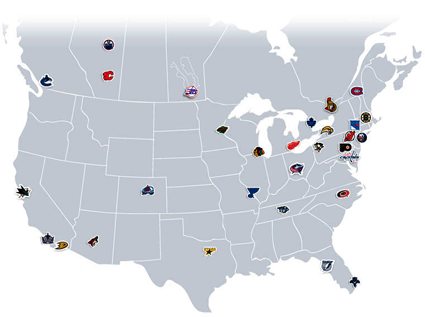
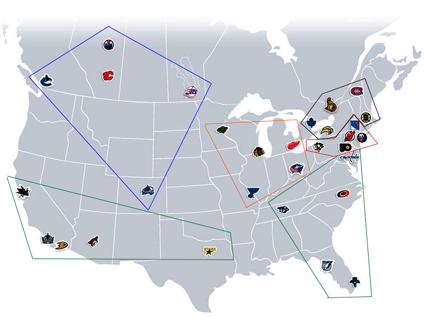
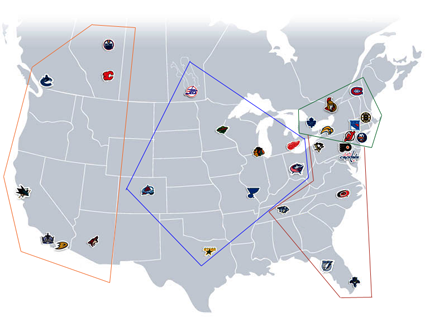
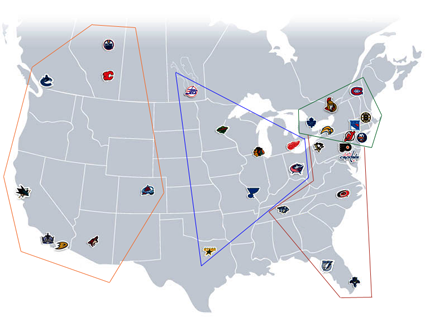










Great job! Your six-division proposal was exactly what I envisioned once the Atlantapeg biz was a done deal. The four-division alignment makes perfect sense, which is why it'll never happen. But personally, I'd love to see the Caps in a stronger division than the current Southleast -- being a Bruins fan and living in the DC market, I'm constantly bombarded by how great the Caps are (the Ovie commercials are the worst) ... maybe better competition would make them less smug.
ReplyDeleteGreat post, I'll have to print this out and use this as a reference!!!!
ReplyDeleteFirst of all, congratulations for the thorough analysis of the situation. I'm a fan of the 4-division alignment and divisional playoffs, too; I tried to figure out a 4-div. alignment with an 82-game schedule but I couldn't sort out the latter (thanks for your suggestion/proposal). The only thing I got different from your 4-division alignment is the Avalanche to the "Smythe" division instead of the "Norris".
ReplyDeleteI thought also about a new 6-division realignment with Atlanta moving to Winnipeg, and it's similar to yours. But I would do it this way:
- Winnipeg: Southeast (East) -> Northwest (West)
- Colorado: Northwest -> Pacific
- Dallas: Pacific -> Central
- Nashville: Central (West) -> Southeast (East)
That is, I would leave the Wild in the Northeast.
Your six division line-up is what more than likely is going to happen. I'm good with that. Makes perfect sense. Even if I am a Wings fan and would love for them to move east, instead of having to deal with 10:30 game times.
ReplyDeleteLike the first comment says, I think the four division realignment makes the most sense (and won't happen). I'm tired of the six divisions. I think rivalries hurt because of it, and you get (possibly) a weak team as the third seed just for being the best of the weakest.
FYI Detroit and Columbus unlike the other Norris division members you propose are in the Eastern Time Zone.
ReplyDeleteAn Eastern Time Zone team being forced to play at 10:35pm (I've yet to see a 10:30pm puck drop) creates issues for fans and advertisers. With a TV contract with several out-clauses based on ratings: the NHL better consider game-time a significant ratings factor if it wants to keep its NBC-Comcast deal the whole length of the agreement.
You can't just keep taking a strong fan base for granted. Moreover you can't take a struggling organization's fan base and continue to play games on work/school nights that last until 1am.
It also hits the owners in the pocket book as jet fuel is now over 4.00 a gallon compared to 0.98 a gallon back in 1998 and flying from coast-to-coast several times a year while the other conference takes bus trips between cities tends to create divisions among the board of governors.
You're realignment plans all boil down to moving a Central Time Zone team with all the other Eastern Time Zone teams while leaving two other Eastern Time Zone teams playing games at 10:35pm more than just a few times a year. That's not acceptable.
Don't be surprised when Detroit starts putting public pressure on the board of governors and commissioner.
PS You all are being incredibly short sided as all your plans have Phoenix in them. Phoenix will be lucky to survive beyond the 2011-12 season. Seattle with its abandoned NBA arena would be move in ready. And I'm sure Quebec would covet the team as well.
Quit your complaining. Dallas has had to play TWO TIME ZONES TO THE WEST for all their games for the entirety of their existence
DeleteThanks for your lengthy reply. While I can see an argument for putting Nashville in the Central in place of Columbus in regards to the Blue Jackets being in the eastern time zone, I still can't see separating Detroit from Chicago, as the two cities are also paired in the same division in the NFL, NBA and American League in baseball. You can't have both Detroit and Columbus in the Eastern Conference just because they are in the eastern time zone simply because of the need to have 15 teams in each conference. Someone's got to go west, and based on their traditional rivalries, between Columbus, Detroit and Nashville, we choose Detroit.
ReplyDeleteAs for being shortsighted for our plans, you will note that they are all dated "2011-12", as we are fully aware of the tenuous nature of the Phoenix franchise, but the fact remains they will remain in Arizona for 2011-12. Any movement beyond that, no matter how likely, is an entirely different matter for another time, and can't currently be discussed without knowing their final destination, which as you point out could be anywhere from Seattle to Quebec, a destination which would only cement Detroit's place in the west that much more.